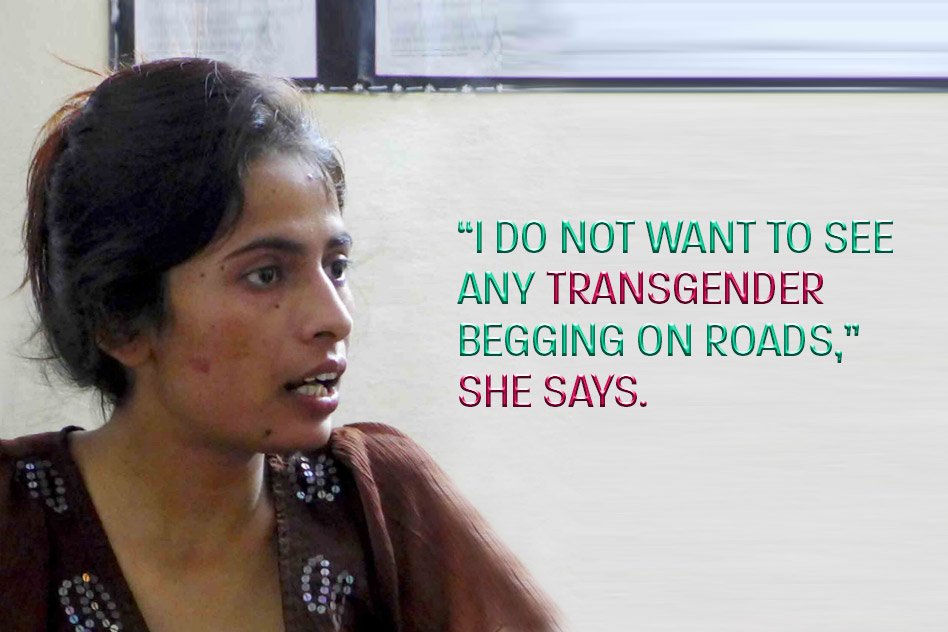
“I Observed A Few Men Who Behaved Like Women And Was Curious To Know The Reason Behind Their Behaviour"
24 March 2017 10:15 AM GMT
22 year-old Sarita Shukla was anxious. It was 28 April 2015 and she had no idea how to arrange the Rs 1,00,000 required for her younger brother’s marriage, which was in two days. She consciously avoided bothering her parents, knowing it would make them nervous.
However, Rasbhari – one of the people Sarita worked with – sensed her concern. Putting Rs 1,00,000 rupees of cash in Sarita’s hand, Rasbhari cajoled her to smile and continue with the celebrations. Rasbhari is a middle-aged transgender who acts as a guru (patron) to her transgender community. The unprecedented help to a non-transgender was the result of Sarita’s selfless work and honest relationship with the community. Tears roll down Sarita’s face as she narrates the incident.
“Rasbhari argued that they share everything with me, so why should I suffer alone?” Sarita became involved with the transgender community during her work with a non-profit organisation called Karmath. “I observed a few men who behaved like women,” Sarita recalls, “And I was curious to know the reason behind their behaviour that I found strange.”
Sarita’s mother tried to explain and asked her to talk to them to get a better understanding.
In Delhi, where Sarita lives, transgender community members can be spotted in areas like Jawaharlal Nehru University Road, Chawdi Bazar, Jama Masjid, Kapasheda, Mahipalpur, and Dhaula Kuan. The good-looking and talented transgenders gain money by dancing or singing. Others end up begging at traffic lights, bus stations or indulge in sexual activities to earn an income. On being refused money, they often hex people.
Transgenders live in exclusion, humiliated by society, rejected by their families, and harassed by the police – both physically and sexually.
One day when she was working in the jungle, Sarita spotted a transgender. She started a gentle interaction with the transgender to understand her life, her reasons for leaving home, and her hopes for the future. The transgender said she was trying to earn money so that she could do a MBA and prove her worth to her family. The response moved Sarita. “Suddenly, I wanted to be acquainted with their dreams and aspirations, the threats they face, the rules they follow, and the life they live,” Sarita recalls.
She felt a strong urge to learn everything about the community. But the road to do this was not easy. “In the beginning, the community used foul language, slammed doors in our faces, even shooed stray dogs after us,” she says.
The rejection failed to deter Sarita, who eventually won their hearts with her compassionate approach. To become closer to them she learnt their rituals, systems, rules, and their secret code language. Soon, she found them pouring out their fears. Identity and inclusion in society were their biggest concerns.
“We started with their voter ID cards, the significant part of which was that they were free to choose their sexuality – female, male, or other,” Sarita says. What followed were 400 bank accounts. Ration cards are next.
To reach this level, we sensitised the police, local administration, banking officials, politicians, and general public,” Sarita says. The efforts softened the public perception and authorities’ attitude towards transgenders. The local community too now treats people with less malice. An avid learner, Sarita incessantly continued to sharpen her knowledge and skills. Her work and search for wisdom led her to interact with a former Changeloomer, Geetanjali, who works with the children of female sex workers.
“I was inspired by ‘Madame Geetanjali’ and her bold style of her working,” Sarita says. “I wanted to follow in her footsteps and do something different.”
Soon, Geetanjali was working as a guide and mentor to Sarita. She motivated her to apply for the Changelooms With.in programme – a year-long fellowship, providing training, mentoring, and financial support to 100 young leaders wanting to address social exclusion within their communities.
Sarita applied and her Changelooms project, “Wo Kaam Jo Karne Hain” (Those Jobs That Need to be Done) was selected. The job she had set herself was to reconnect 20 transgenders with their families.
“Their biggest tussle is not with the police or society, but with their families who reject them,” says Sarita. Rupasi, a transgender, is just one example – she left her home when she was 17. The reason was that her demeanour caused an embarrassment to the family. Today she is one of the transgenders associated with Sarita’s Changelooms project. The project, which started in March 2014, is in its nascent stage. However, Sarita’s determination has grown high. Convincing parents has been challenging. Approaching the task strategically, Sarita first identified those family members who were sensitive and ready to understand. With the help of a doctor, she counselled them.
The Changelooms programme has given an opportunity to Sarita to carve a niche for herself in the development sector. She feels encouraged: “My work is being recognised. Earlier people knew the organisation, but now they know Sarita who is working with transgenders.”
The training and mentoring have enabled Sarita to handle interviews deftly. She can now efficiently design workshops, conduct meetings, and plan her work. With the financial support, she has been able to conduct awareness workshops and surveys.
However, she considers networking with other Changeloomers as her biggest achievement. There are five other Changeloomers who have linked up with Sarita’s project to work with transgenders. They enjoy the comfort level as the community is open and cooperating.
The next task Sarita has set for herself is to link transgenders with livelihood activities for inclusion in society. She has identified a few activities already, like fashion designing, selling street food, beauty therapy, and jewellery making.
Out of 10 transgenders identified for these activities, Rupasi’s Momos kiosk will be the first to start soon at Delhi’s South Extension.
“I do not want to see any transgender begging on roads,” Sarita says. “My aim in life is to see them become doctors, bus drivers, teachers, MBAs… realising their dreams.”
With #MySocialResponsibility, we aim to bring you more inspiring stories of individuals and organisations across the globe. If you also know about any changemakers, share their story at [email protected] and we'll spread the word.
 All section
All section













